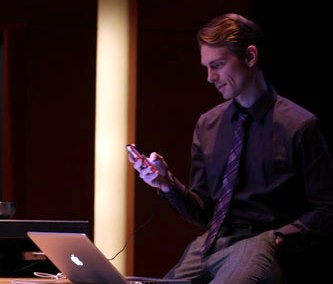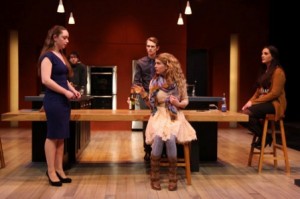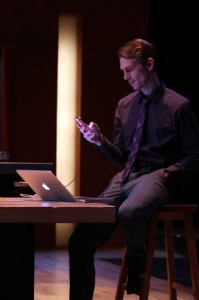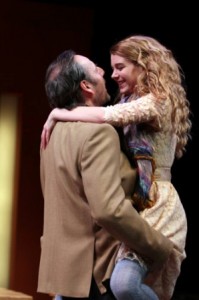“No man is an island…”
I’m sure many of you are familiar with that quote by 17th century poet John Donne. It kept swirling around in my mind as I watched Torben Betts’ play MUSWELL HILL, now playing at Villanova’s Vasey Hall. Inspired by observing a couple at a local pub who spent the entire time buried in their Smartphones, Betts has written a darkly comic indictment of our addiction to electronica.
One is greeted by a sleek minimalistic modern kitchen when entering the theatre; no frills, no personal touches, just the necessary accoutrements—but very upscale. And there is something stewing on the cooktop, as well as casseroling in the wall oven. In that kitchen throughout the pre-show is actor Ahren Potratz, who portrays Mat (yes, one “t”), a struggling writer. Potratz spends the entire 30 minutes prior to curtain cruising the internet on his laptop and texting on his cell. On occasion he also appears to be working on his latest “masterpiece” as well. The contemporary pre-show music emanates from his laptop, and he grooves to it subtly as he texts or whatever. Soon, his wife Jess (Victoria Rose Bonito) enters; she is focused on the screen of her cell. As she casually switches the kitchen lights on, the house lights go out and the performance starts. It is the evening of January 13th, 2010.
Muswell Hill is an upscale suburb of London, akin to, say, Manayunk or Bala. Jess and Mat are what we would call “Yuppies,” and they are having a dinner party. As they do the final preparations, they repeatedly express sympathy for the victims of the Haiti earthquake the day before—the usual “Isn’t it awful” phrases we all utter in the face of such epic tragedies. They are also constantly attached to their phones or the laptop: checking e-mails, going to Facebook, texting, etc.
That is why the line of poetry floated into my brain. I was struck by the fact that in spite of all of the instant connectivity we have at our fingertips today, we may be even more isolated from our fellow man than ever before. The two characters don’t have any real conversation for several minutes. Then, suddenly Matt asks Jess if she is, in fact, having an affair—and the door buzzer sounds.
First to arrive is Jess’ best friend, Karen (Madeline Iacobucci). She is a hospice nurse who is still recovering from the suicide of her husband, cancer sufferer Julian. Karen has, as another character so aptly puts it, verbal diarrhea. No thought is left unsaid; she fills the void in her life and heart with words. Lots of them. Next on the scene is Simon (Seth Thomas Schmitt-Hall), Mat’s old college chum. A more socially inept soul you will not find anywhere. Like their hosts, these two are also fused to their cell phones. And like their hosts, they are offering sporadic commentary on the prior day’s events that are equally detached. The two start out the evening antagonistically but, as the wine flows, they become attracted to each other. The final pair to hit the scene are Jess’ adoptive baby sister Annie (Sarah Moya) and her much, much older boyfriend, Tony (Joe Guzmán). Twenty-something Annie, who has a potpourri of neuroses and addictions, thinks Tony, a 60 year old stage director, is going to both marry her and launch her career. The fact she’s never acted before doesn’t faze her. Needless to say, Jess does not approve.
Bonito and Potratz adeptly convey that ennui that sets in after years of marriage. Two people occupying the same space, but not really invested in each other. Their interplay as Mat and Jess is very interesting to watch. For such young actors, they had a solid grasp on the emotions—or lack thereof—of this couple. Bonito is a new face to me; she was very genuine as a wife who is longing for more out of her marriage. I look forward to seeing more of her work. I have seen Potratz in a number of productions over the years and he continues to give strong performances; this turn as a man struggling to make a mark on the world so “people will remember I was here” is no exception.
Iacobucci captures Karen’s vapidness quite nicely. She was very believable as a woman who finds her self-worth in a man. But her rapid-fire delivery made her words unintelligible at times; as a dialect coach, I always stress over-enunciating whenever possible so American ears can understand the British phrasing and terminology. I enjoyed Schmitt-Hall’s deft handling of Simon, a character who could be exceedingly annoying. Yet Schmitt-Hall imbued him with a vulnerability that tugged at you. This young man has the makings of a great comedic actor. Moya’s over-the-top turn as the troubled Annie was pitch-perfect. She knows how to take it to the line, but never goes over, a great gift to have as a performer. As her counterpoint, guest artist Joe Guzmán gives us a true bounder (as the Brits would say). His portrait of a bloviating theatrical director in the midst of a mid-life crisis was spot-on. (I did wonder which of his past directors he might be channeling…) Another dislikable character, in Guzmán’s hands Tony becomes a tad charming in spite of his selfishness. You want to smack him, but you feel sorry for him too.
As a director, Harriet Power always keeps things well-paced. It is clear she has a great deal of creative input, but also that she gives her actors an environment to invent fully realized human beings. I am an admirer of her abilities as a director and always look forward to any production she is connected with. The design work supporting her endeavors is topnotch. The aforementioned kitchen was created by Daniel Boylen (with an assist from K&D Appliances). It is the perfect atmosphere for the piece. Long-time Villanova lighting designer Jerrold R. Forsyth has turned in another solid bit of work, evoking just the right focus and mood without intruding on the performances. Marla Jurglanis provides lovely costuming—each ensemble giving hints about the characters. Her work is always perfect. John Stovicek provides a crisp and clever sound and video design that supports the story nicely, while subtly editorializing on the situation we’re viewing.
Betts’ character study is an interesting script, but I did feel at times he was packing too many concepts into one piece. In addition to the backdrop of the Haitian disaster, he has written an anti-American/anti-Obama screed for Simon about 9/11 and Iraq that seems to be totally off-topic. I would prefer he had focused on his theme of today’s obsession with instant access and electronica and its effect on actual communication. But, I have found myself thinking about these characters since seeing the production. So, clearly this is a play worth seeing—and mulling. Tweet me your reactions…[@theatregal714]
MUSWELL HILL
by Torben Betts
Directed by Harriet Power
February 12—24, 2013
Villanova Theatre
Vasey Hall
610-519-7474
www.villanovatheatre.org





